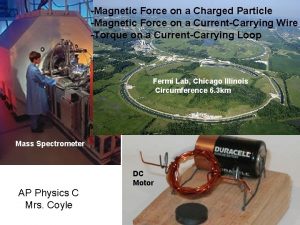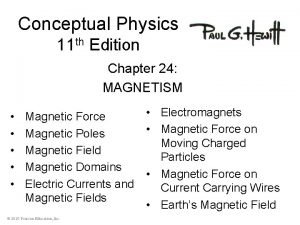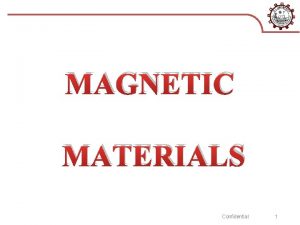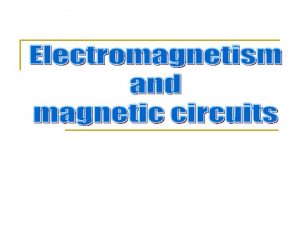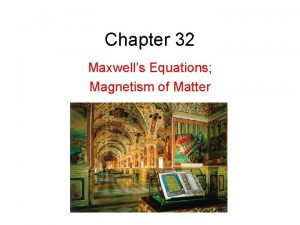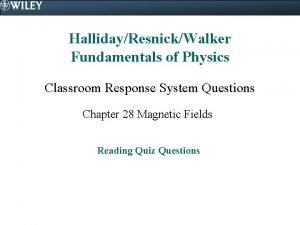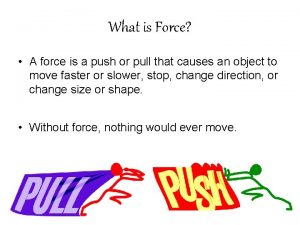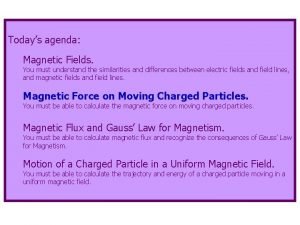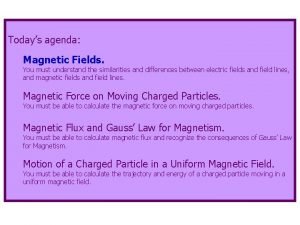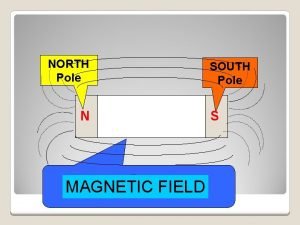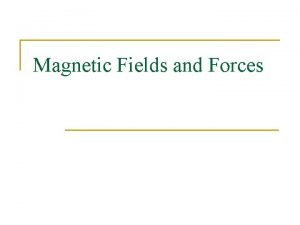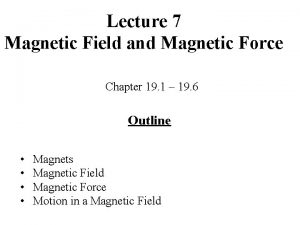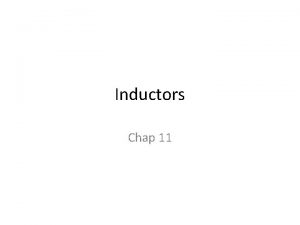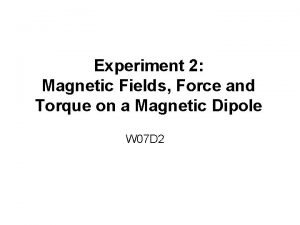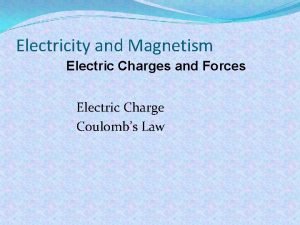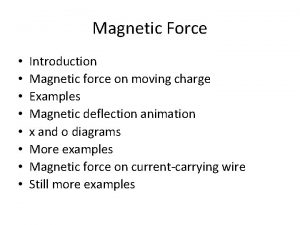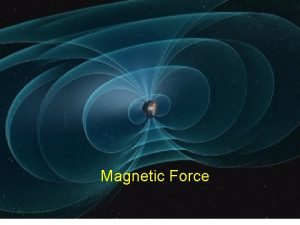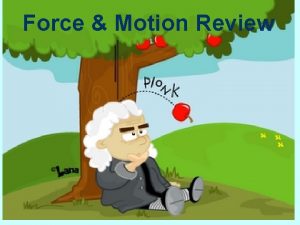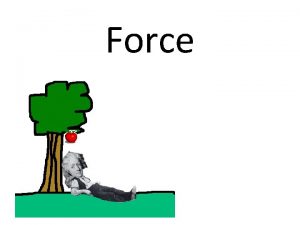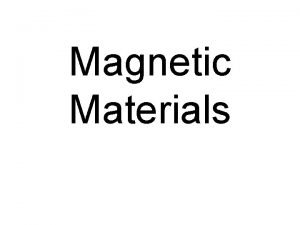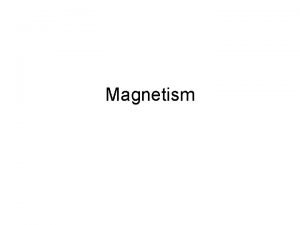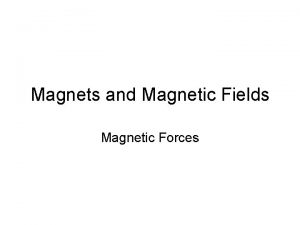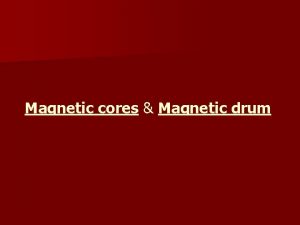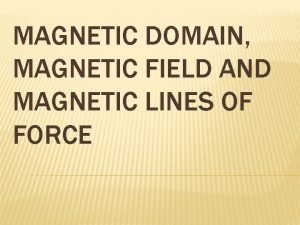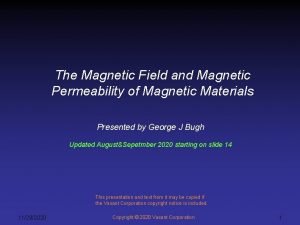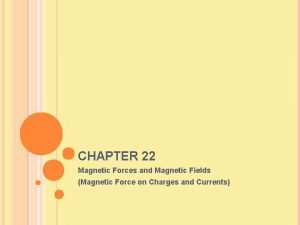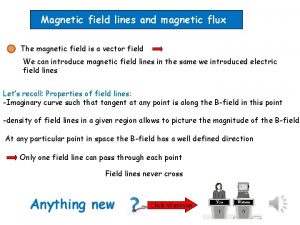Fundamentals of Physics 8e 28 Magnetic Force D
















- Slides: 16

Fundamentals of Physics 8/e 28 - Magnetic Force D. Halliday, R. Resnick, and J. Walker 國立彰化師大教學卓越計畫 理學院普通物理整合型教材 主持人:郭艷光院長

Outline n n n n n 28 -1 What Is Physics? 28 -2 What Produces a Magnetic Field? 28 -3 The Definition of 28 -4 Crossed Fields: Discovery of the Electron 28 -5 Crossed Fields: The Hall Effect 28 -6 A Circulating Charged Particle 28 -7 Cyclotrons and Synchrotrons 28 -8 Magnetic Force on a Current-Carrying Wire 28 -9 Torque on a Current Loop 28 -10 The Magnetic Dipole Moment 彰化師大教學卓越-普物教材-理學院長郭艷光主持 2

28 -1 What Is Physics? n As we have discussed, one major goal of physics is the study of how an electric field can produce an electric force on a charged object. n A closely related goal is the study of how a magnetic field can produce a magnetic force on a (moving) charged particle or on a magnetic object such as a magnet. 彰化師大教學卓越-普物教材-理學院長郭艷光主持 3

28 -2 What Produces a Magnetic Field? n. One way is to use moving electrically charged particles, such as a current in a wire, to make an electromagnet. n. The other way to produce a magnetic field is by means of elementary particles such as electrons because these particles have an intrinsic magnetic field around them. 彰化師大教學卓越-普物教材-理學院長郭艷光主持 4



28 -3 The Definition of Magnetic Field Lines At any point P the magnetic field vector is tangent to the magnetic field lines. n The magnitude of the magnetic field vector is proportional to the density of the magnetic field lines. n n P P magnetic field line Q magnetic field lines 彰化師大教學卓越-普物教材-理學院長郭艷光主持 7

28 -4 Crossed Fields: Discovery of the Electron Cathode Anode J. J. Thomson in 1897 used a version of this tube to investigate the nature of the particle beam that caused the fluorescent spot. 彰化師大教學卓越-普物教材-理學院長郭艷光主持 8


28 -6 A Circulating Charged Particle . electron C . r 彰化師大教學卓越-普物教材-理學院長郭艷光主持 10


28 -7 Cyclotrons and Synchrotrons n The key to the operation of the cyclotron is that the frequency f at which the proton circulates in the magnetic field (and that does not depend on its speed) must be equal to the fixed frequency fosc of the electrical oscillator, or f= fosc (resonance condition). n. At proton energies above 50 Me. V, the conventional cyclotron begins to fail because one of the assumptions of its design—that the frequency of revolution of a charged particle circulating in a magnetic field is independent of the particle’s speed—is true only for speeds that are much less than the speed of light. 彰化師大教學卓越-普物教材-理學院長郭艷光主持 12

28 -8 Magnetic Force on a Current-Carrying Wire i . 彰化師大教學卓越-普物教材-理學院長郭艷光主持 13



 Magnetic force particle
Magnetic force particle Conceptual physics magnetism
Conceptual physics magnetism Difference between magnetic flux and magnetic flux density
Difference between magnetic flux and magnetic flux density Magnetic field density
Magnetic field density Magnetic moment and magnetic field relation
Magnetic moment and magnetic field relation Physics classroom magnetic field
Physics classroom magnetic field Gravity force
Gravity force Magnitude of magnetic force
Magnitude of magnetic force Gauss law of magnetism
Gauss law of magnetism Magnetic field strength formula
Magnetic field strength formula Force on a charge in magnetic field
Force on a charge in magnetic field Force of magnetic field
Force of magnetic field Unit of magnetic field
Unit of magnetic field Static electricity
Static electricity How to calculate magnetic force
How to calculate magnetic force Magnetic field in a closed loop
Magnetic field in a closed loop Electric force equation
Electric force equation
